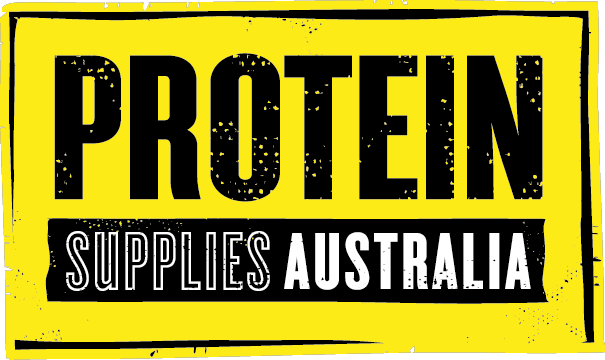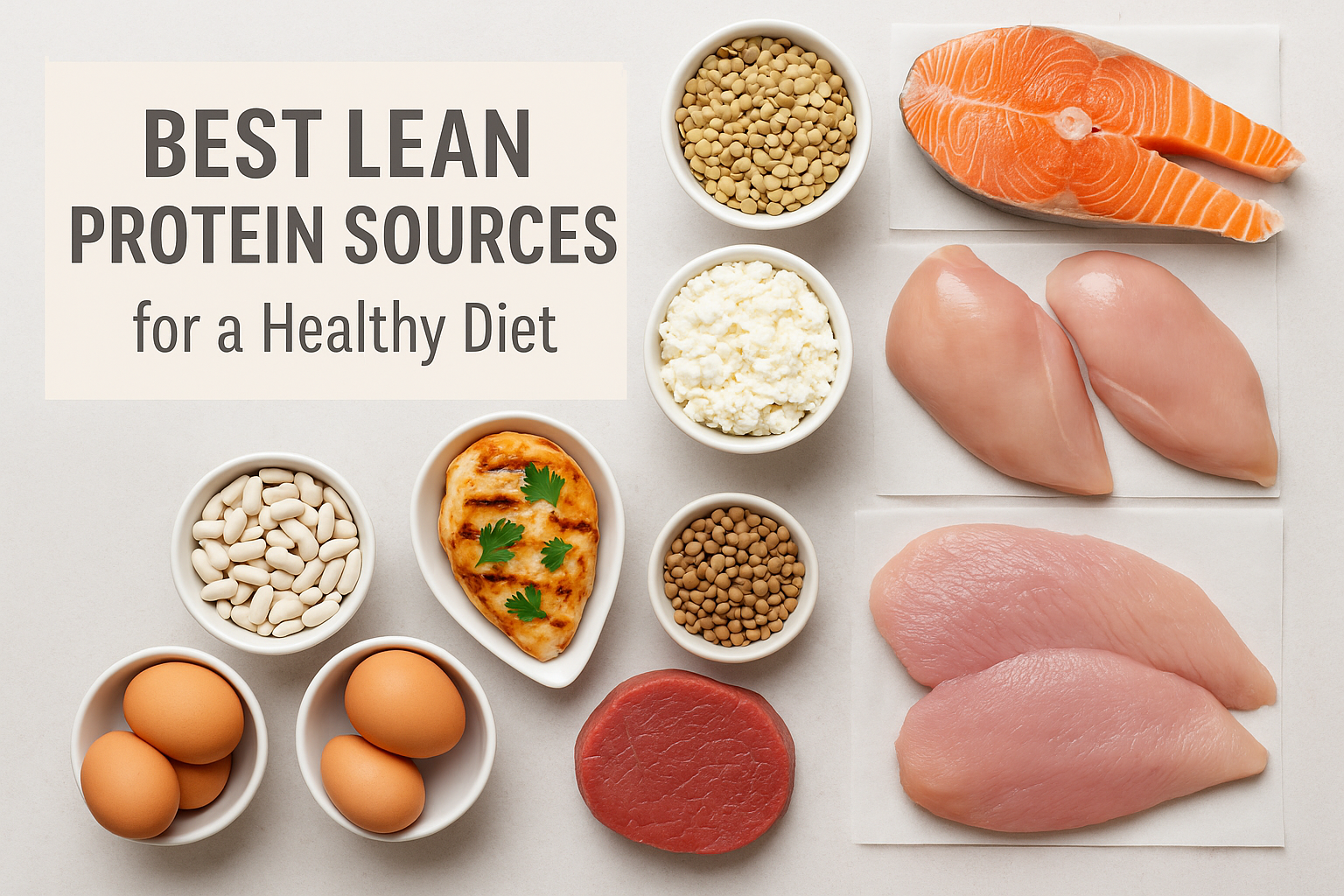Looking to add lean protein to your diet? This article covers the best sources of lean protein, including chicken, fish, beans, and tofu. Learn how these proteins benefit your health and how to include them in your meals. Perfect for muscle growth, weight management, or simply eating healthier.
Key Takeaways
-
Lean protein is essential for muscle maintenance, metabolic health, and overall well-being, with recommended daily intake around 5.5 ounces for a 2,000-calorie diet.
-
Top animal-based lean protein sources include skinless chicken breast, turkey, and fish, while plant-based options include beans, lentils, tofu, and tempeh, providing healthy alternatives for diverse diets.
-
Incorporating lean protein into meals, from breakfast to snacks, enhances satiety, supports weight management, and ensures balanced nutrition, but it’s essential to avoid excessive protein intake to mitigate potential health risks.
Understanding Lean Protein
Lean protein is an essential macronutrient that can be sourced from various foods, including Organic Brown Rice Protein:
-
Meat
-
Dairy products
-
Nuts
-
Vegetables
-
Grains
-
Beans
Protein is crucial for building and repairing tissues, maintaining muscle mass, and supporting metabolic functions. For adults consuming around 2,000 calories per day, it’s recommended to have approximately how much protein is needed, which is about 5.5 ounces of daily protein.
Including protein-rich foods in your diet supports overall health and well-being. Proteins provide the building blocks for cells and help maintain muscle mass, making them indispensable for a healthy lifestyle. Whether you prefer plant-based or animal-based protein sources, there are plenty of options to choose from.
Top Animal-Based Lean Proteins
Animal-based proteins are often touted for their high-quality amino acid profiles and other essential nutrients from animal sources, including important nutrients. These proteins are not only high in protein content but also provide essential amino acids and non essential amino acids necessary for the body to function optimally, making them an essential nutrient.
Three top choices are skinless chicken breast, turkey, and fish.
Skinless Chicken Breast
Skinless chicken breast is a powerhouse of lean protein, providing around 31 grams of protein per 100 grams. It’s low in saturated fat, making it a healthy choice for those looking to build muscle or manage weight. The versatility of skinless chicken breast means it can be used in a wide range of recipes, from salads to stir-fries, making it an easy addition to your diet.
Skinless chicken breast delivers high-quality protein without the added fats found in processed meats. This makes it a go-to option for anyone aiming to maintain a balanced diet. Whether grilled, baked, or poached, skinless chicken breast is a delicious and nutritious choice.
Turkey
Turkey is another excellent lean meat option, high in protein and low in fat. This makes it ideal for those looking to increase their protein intake while keeping calorie consumption in check. A diet that includes turkey can aid in weight management, thanks to its high protein content promoting satiety and reducing overall calorie intake.
Turkey can be easily incorporated into meals, whether in sandwiches, salads, or as the main course. This lean poultry option is not only delicious but also helps ensure you get enough protein without excess fat, supporting a healthy diet and lifestyle.
Fish
Fish like tuna and salmon are fantastic sources of lean protein, providing about 25 grams of protein per 100 grams. Salmon, in particular, is rich in omega-3 fatty acids, which are essential for heart health. Including fish in your diet can contribute to a balanced diet and support overall health.
Fish are incredibly versatile and can be prepared in numerous ways. Whether grilled, baked, or sautéed, fish can be a delightful addition to your meals. The high protein content and health benefits make fish an excellent choice for anyone looking to enhance their diet with lean protein.
Best Plant-Based Lean Proteins
Plant-based proteins are equally important and offer a variety of options for those who prefer not to eat meat. These protein foods can be just as effective in meeting your protein needs and often come with added benefits like fiber, essential nutrients, and plant proteins.
Two of the best plant-based lean protein sources are beans and lentils, and tofu and tempeh.
Beans and Lentils
Beans and lentils are excellent sources of plant-based protein, rich in dietary fiber, which aids in digestion and supports heart health. Black beans, for example, can be prepared in various ways, making them adaptable to many recipes. These legumes are not only nutritious but also versatile, fitting well into a variety of dishes.
Tofu and Tempeh
Tofu and tempeh are fantastic sources of plant-based protein, each offering unique benefits. Tofu provides all nine essential amino acids, making it a complete protein. It is also versatile and can be used in a variety of dishes, from stir-fries to smoothies.
Tempeh, on the other hand, is fermented, which enhances its protein content and adds beneficial probiotics. Both tofu and tempeh are rich in iron and calcium, essential for bone health. Tofu is lower in calories, making it a lighter option, while tempeh has a nuttier flavor and firmer texture, which can be more satisfying in various dishes.
Including these in your diet can help you meet your protein needs effectively.
Benefits of Including Lean Protein in Your Diet
Incorporating lean protein into your diet offers many benefits. From muscle repair and growth to weight management, lean proteins are essential for maintaining overall health.
A varied diet with both plant-based and animal-based proteins can help achieve balanced nutrition and support a healthy lifestyle, contributing to its nutritional value.
Muscle Growth and Maintenance
A higher-protein diet is crucial for muscle repair and growth, especially for athletes and older adults. Skinless turkey breast, for example, is low in calories and high in protein, making it suitable for building muscle tissue. Including a high-protein food in every meal helps maintain muscle mass and promotes satiety.
Lean protein can also improve metabolic health and enhance the body’s ability to burn fat, which is particularly beneficial for those looking to maintain muscle mass and support healthy weight management while considering body composition.
Weight Loss and Management
Including protein-rich foods in your diet can enhance feelings of fullness, aiding in weight management. Lean protein can reduce cravings, supporting weight loss efforts. Turkey, with its high protein content and low fat levels, is a great example of a food that promotes satiety and helps you lose weight by reducing overall calorie intake.
Pea protein may also help increase feelings of fullness longer than whey protein, making it a valuable addition to a weight loss diet. Incorporating lean protein into your meals can help you achieve and maintain a healthy weight.
How to Incorporate Lean Protein into Meals
Incorporating lean protein into your meals is easier than you might think. From breakfast to dinner and even snacks, there are countless ways to ensure you get more than enough protein without reduced fat excess fats.
Let’s explore some practical meal ideas.
Breakfast Ideas
Start your day with a nutritious, protein-packed breakfast, such as an omelette made with vegetables. For a sweet option, try protein pancakes made from oats, eggs, and added protein powder.
Greek yogurt topped with fruits, nuts, and seeds offers a mix of protein and healthy fats. High-protein breakfasts help in maintaining muscle mass and promoting satiety throughout the day.
Lunch and Dinner Ideas
Grilled fish tacos topped with cabbage and salsa make a delicious protein-rich meal option for lunch or dinner. A quinoa bowl with black beans, avocado, and a lime vinaigrette is another nutritious choice. Including lean proteins in your lunch and dinner helps support muscle maintenance and overall health.
Lean proteins such as chicken, fish, and beans can easily be adapted into numerous recipes, making them versatile options for any meal. These meals ensure you get enough protein while enjoying a balanced diet that includes lean meats and high protein foods.
Snacks
Snacks are a great opportunity to incorporate lean protein into your diet. Cottage cheese can serve as a versatile snack, packed with protein, calcium, and other nutrients. It can be eaten on its own or mixed with fruits and nuts.
Nut butters, such as peanut butter and almond butter, are also great sources of protein. They can be used on toast, in smoothies, or as a dip, making them versatile snack options. A hard-boiled egg is a convenient snack. It is also high in protein.
Choosing the Right Protein Powder
Selecting the right protein powder in its powdered form can make a significant difference in meeting your protein needs. Whey protein is derived from milk and is popular for increasing muscle mass and strength. Pea protein, on the other hand, comes from yellow split peas and is a great plant-based alternative.
When choosing a protein powder, it’s important to read nutrition labels carefully, as some whey proteins contain added sugar and sweeteners.
Summary
Incorporating lean protein into your diet offers numerous benefits, from muscle growth to weight management. Whether you prefer animal-based or plant-based proteins, there are plenty of options to meet your needs. Remember to balance your diet and enjoy a variety of protein sources for optimal health.
With the practical tips and meal ideas provided, you can easily make lean protein a part of your daily routine. Embrace the benefits of lean protein and take a step towards a healthier, more balanced lifestyle.








Top Protein Shake Recipes for Muscle Gain
Whey Protein: Is It Good for You? Find Out the Pros and Cons